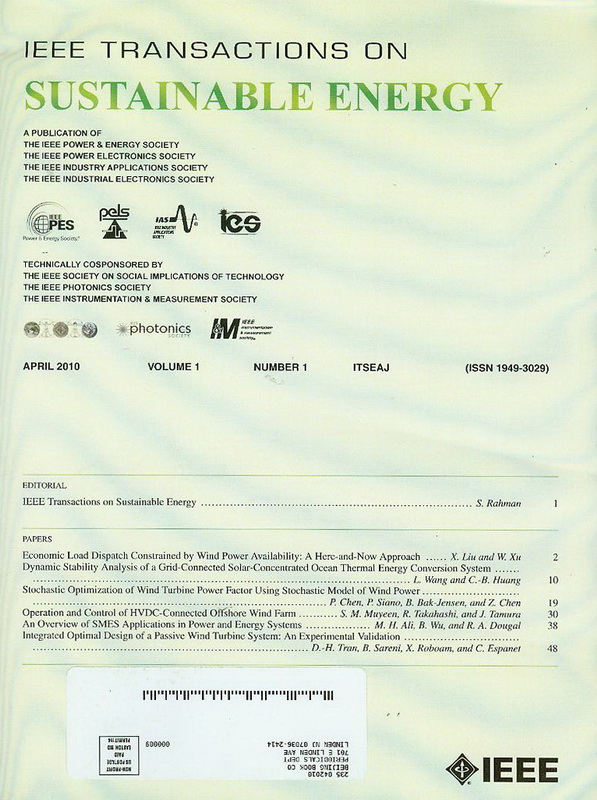Event-Triggered H-Infinity Pitch Control for Floating Offshore Wind Turbines
IF 10
1区 工程技术
Q1 ENERGY & FUELS
引用次数: 0
Abstract
The complex wind and wave environment can lead to increased external disturbances and power fluctuations of floating offshore wind turbines, posing a significant challenge to their stable operation. To cope with this issue, this paper formulates an event-triggered H-infinity pitch control strategy for floating offshore wind turbines. Firstly, a linear parameter varying model of floating offshore wind turbines is proposed, utilizing the dynamic characteristics of subsystems while considering the combined external disturbances from wind and wave. Then, the event-triggered control strategy is introduced into the H-infinity pitch control of floating offshore wind turbines. Based on this, a criterion for the asymptotic stability and H-infinity norm boundedness of floating offshore wind turbines is derived. Furthermore, an algorithm is presented for designing feedback gain matrices of the event-triggered H-infinity pitch control, which can effectively reduce the update frequency of the controller. Finally, a simulation is conducted on the IEA 15 MW Reference Wind Turbine by integrating OpenFAST with MATLAB/Simulink. The simulation results provide a comparative analysis of the event-triggered H-infinity pitch control strategy and the continuous-time pitch control strategy, demonstrating the superiority of the method proposed in this paper.用于漂浮式近海风力涡轮机的事件触发 H-Infinity 变桨控制
复杂的风浪环境会导致海上浮式风力发电机组受到的外部干扰和功率波动增大,对海上浮式风力发电机组的稳定运行构成重大挑战。针对这一问题,本文提出了一种事件触发的海上浮式风力机h∞螺距控制策略。首先,利用各子系统的动态特性,考虑风、波的综合干扰,建立了浮动式海上风力机的线性参数变化模型;然后,将事件触发控制策略引入到浮式海上风力机的h∞螺距控制中。在此基础上,导出了海上浮式风力发电机渐近稳定性和h -无穷范数有界性的判据。在此基础上,提出了一种事件触发h∞螺距控制反馈增益矩阵的设计算法,有效地降低了控制器的更新频率。最后,将OpenFAST与MATLAB/Simulink集成,对IEA 15mw参考风力发电机组进行了仿真。仿真结果对事件触发h∞螺距控制策略和连续时间螺距控制策略进行了对比分析,验证了本文方法的优越性。
本文章由计算机程序翻译,如有差异,请以英文原文为准。
求助全文
约1分钟内获得全文
求助全文
来源期刊

IEEE Transactions on Sustainable Energy
ENERGY & FUELS-ENGINEERING, ELECTRICAL & ELECTRONIC
CiteScore
21.40
自引率
5.70%
发文量
215
审稿时长
5 months
期刊介绍:
The IEEE Transactions on Sustainable Energy serves as a pivotal platform for sharing groundbreaking research findings on sustainable energy systems, with a focus on their seamless integration into power transmission and/or distribution grids. The journal showcases original research spanning the design, implementation, grid-integration, and control of sustainable energy technologies and systems. Additionally, the Transactions warmly welcomes manuscripts addressing the design, implementation, and evaluation of power systems influenced by sustainable energy systems and devices.
 求助内容:
求助内容: 应助结果提醒方式:
应助结果提醒方式:


